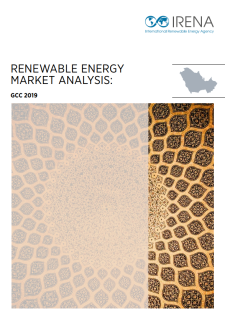
Renewable energy has advanced rapidly in the Gulf Cooperation Council (GCC) countries since 2014. The project pipeline reached almost 7 gigawatts (GW) of new power generation capacity by 2018, after the United Arab Emirates (UAE) made record-breaking bids in renewable energy auctions and Saudi Arabia made solar power cost-competitive with conventional energy technologies. Abundant resources, together with strong enabling frameworks, have led to solar PV prices of below USD 0.03 per kilowatt hour and dispatchable concentrated solar power (CSP) of USD 0.07 per kilowatt hour, which is less than some utilities in the region pay for natural gas.
This report explores the prospects for renewables to diversify both national economies and the combined GCC energy mix, while also helping the region to meet its climate commitments and contribute to the 2030 Agenda for Sustainable Development. While wealth and socio-economic development across the GCC remain closely tied to the region’s substantial oil and gas reserves, rising populations and economic diversification have led to greater energy demand. Renewables, although a relatively recent entrant to the GCC energy landscape, hold vast potential to cut fuel costs, reduce carbon emissions, conserve scarce water, and create jobs.
